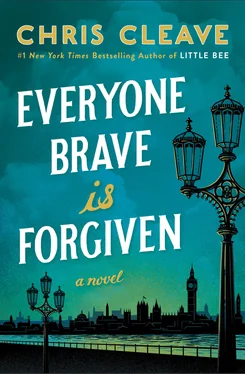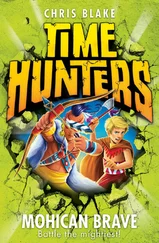When he could no longer stand it he crossed the road to the public house and drank three doubles in a row. He went out into the snow, walked for a while without purpose and then headed for Mary’s school. When he got there he knocked the snow from his shoes and coat, sat on a tiny chair at the back of her classroom and watched her taking the children through the dress rehearsal for their nativity play.
A savior was born for all mankind: this seemed to be the gist of it. Everyone would be excused, for everything they’d done. It sounded neat. His hands still shook from the cold, so he clasped them to his knees.
Mary mouthed to him: Are you all right? He smiled back at her across the children’s heads while his awareness broke into fragments and each nerve vibrated with the high note of a cable approaching its maximum tension.
The little ones were in costume. Mary sat at the piano, producing a rather chirpy version of “It Came Upon a Midnight Clear.” She even managed to swing the tune a little, giving the distinct impression that whatever had come on that clear midnight had come via the drinks cabinet. He ached for her. There was nothing she couldn’t transform. It was unbearable.
She had cast a nice, sensible girl as the narrator. Betty came forward as the last chord faded. “Long ago in the city of Nazareth, an angel came to Joseph and Mary. And the angel said…”
There was a long silence during which everyone looked at the angel.
From the piano, Mary whispered, “Behold…”
Kenneth remembered his line. “Behold! A! Virgin! Shall! Be! With! Child! And! Shall! Bring! Forth! A! Son! And! They! Shall! Call! His! Name! Emmanuel!”
“Speak up,” said Mary. “There are a few Chinese who mightn’t have heard you.”
“Emmanuel,” whispered Kenneth.
His wings, which were of papier-mâché, slipped down to his waist. Poppy, who was dressed as a lamb, went behind him to hold the wings up to his shoulders. Together, they made a hybrid creature that had not been needed in any of the myths. Tom laughed, but tears prickled at the same time.
He supposed he was only exhausted. The bombing kept everyone awake. At the office one had become accustomed to colleagues making a sudden break for the lavatory. Everyone knew it was only to weep, and yet it would seem to outsiders as if the city were in the grip not of war but of some great bellicose incontinence.
He tried to concentrate on the play. Thomas, dressed in a toga and with a laurel crown on his head, propelled himself to center stage in his wheelchair, which had been clad with gold boards to make it into a Roman chariot.
Betty said, “And it came to pass in those days, that there went out a decree from Caesar Augustus.”
Thomas said, “All the world shall be taxed!”
Maud came to the front with Zachary, both in robes and tea towels, with halos wobbling. Maud was a timid girl, rather a good casting for the virgin mother. Tom felt that Zachary was an inspired choice for Joseph, and he wondered if Mary had meant it as a joke. It would be easy to verify the divine provenance, the deity being white and the husband as dark as Herod’s heart.
Now he worried that he didn’t know whether she had meant it to be funny. He knew her less than he had at the start. The enemy dropped payloads of doubt.
He wished he had Alistair for advice. Alistair, old man, he might say. I am beside myself. I am spent . But Alistair was in Malta now, and his letters came infrequently. When they did, they had no substance. Everything operational was omitted, anything sentimental avoided, until only their old jokes remained. Perhaps the friendship was over. Perhaps it was not possible, after all, for a man who had gone to war to abide a man who had stayed.
Tom gripped his tiny chair and ground his teeth in misery.
Betty said, “But in Bethlehem, there was no room for them anywhere.”
The children lined up to sing. They stood in order of diminishing glory, angels to lambs. Beside Poppy were two more lambs in white jumpers with cotton wool twists. There was little Beryl, the beauty with her fixed smile and disconcerting stillness, and there was the idiot George, whose size was alarming amid the diminutive cast but who followed Poppy with great docility. The lambs lined up beside Caesar, the holy spouses, the angel and the narrator. As Mary struck up the tune on the piano, they sang.
No beautiful chamber, no soft cradle bed
No place but a manger, nowhere for His head
No praises of gladness, no thought of their sin
No glory but sadness, no room in the inn
Tom lurched from anguish to a desperate urge to laugh again. How perfect that a savior had come to earth who could heal and forgive, but that what everyone sang about was the local guesthouse being full. It was a perfectly English take on a divine visitation — the kind of thing old colonels wrote indignant letters to The Daily Telegraph about.
Sir—
But there was a comfort, after all, in the old unchanging story. Perhaps the distance would close again between him and Mary. Perhaps it wasn’t just him — maybe everyone felt unsure. From the crushing fatigue and the fear, the constant mental strain of saying to others, We shall prevail, and to oneself, I am defeated .
Now, hearing the children sing, Tom felt a glow of hope. Perhaps the war would be won after all. Mary would laugh in his arms again, and the great moaning sirens would stop.
When the children came to the end of the song, Mary kept the music going softly while the holy couple laid a doll in a straw-lined milk crate.
Betty said, “And she brought forth her firstborn son, and wrapped him in swaddling clothes, and laid him in a manger. And the shepherds came from the fields and asked Joseph the newborn’s name. And Joseph said…”
A long pause. “And Joseph said…”
Zachary was frozen, eyes wide.
“Come on, darling,” prompted Mary. “Joseph said…”
Zachary burst into tears and bolted, slamming the classroom door behind him. The children began to laugh and murmur until Mary silenced them with two claps of her hands. “Children! Please! We’ll practise the hymn again. Mr. Shaw, would you please go and see to Zachary?”
Tom found himself making the foolish gesture of Who, me? and almost died under Mary’s patient look.
He found the boy in front of the school, kicking furiously at the snow.
“It’s stupid!” Zachary shouted when he saw Tom. “It’s a stupid play and I don’t even want to remember my stupid lines!”
Tom almost argued, then gave up and leaned against the porch.
Zachary scowled at him. “You don’t care?”
“It isn’t Hamlet .”
“You’re drunk.”
Tom lit a cigarette. “Tell me, why do you come to school?”
“Get my education.”
“And what will you do with it?”
“Get a job. I’m not going in the minstrel show.”
“Why not?”
“You saw it. Would you be in it?”
“I can’t imagine the equivalent. There’s no such thing as a white minstrel show, is there? Unless one does count Hamlet .”
“I don’t care about that.”
“You don’t care about much.”
“You don’t know.”
“But you keep running away. Miss North showed me your reports.”
“So?”
“So, I’m just saying. If you want to come to school, why do you run off?”
Zachary looked down. “Are you going to give me detention?”
Tom couldn’t help laughing.
“What?” said Zachary.
“Detention? No. Not unless you kick any more of that snow my way.”
Zachary stopped. “It’s too much, if you want to know.”
Читать дальше












